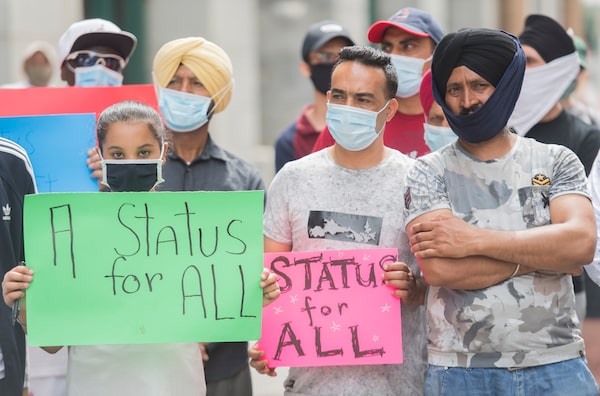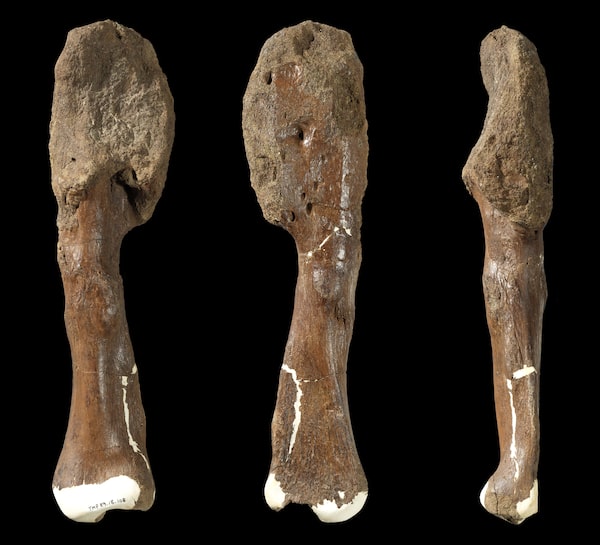Good morning,
In an attempt to limit the spread of COVID-19, some agricultural employers are restricting the movement of migrant farm workers in several provinces. The new measures are raising questions about the rights of temporary foreign workers, many of whom fear reprisal or deportation if they speak out.
Employers are asking workers to sign agreements or conform to rules that confine them to the property. Some employees said they have not left their workplaces in several months, as restrictions prevent them from even getting groceries or visiting spouses and children.
The temporary foreign worker program has long been criticized for enabling power imbalances between farm operators and their workers, a situation that has only become clearer since the onset of the COVID-19 pandemic. The virus has shone a light on not only the poor working and living conditions that migrant workers face, but also of their essential role in supporting the Canadian food system. Migrant workers have been hit hard by COVID-19, with more than 1,300 migrant farm workers falling sick in Ontario alone, according to a Globe and Mail investigation.

People hold up signs as they demonstrate outside an immigration office in Montreal, Sunday, July 26, 2020, where they called on the government to give residency status to all migrant workers and asylum seekers.Graham Hughes/The Canadian Press
This is the daily Morning Update newsletter. If you’re reading this on the web, or it was forwarded to you from someone else, you can sign up for Morning Update and more than 20 more Globe newsletters on our newsletter signup page.
Big names continue to donate to WE charities in the U.S., despite recent controversy
WE Charity is well-known for its ability to attract public figures and persuade them to donate large amounts of money in support of their cause. A Globe and Mail review of WE’s U.S. regulatory filings over the past decade is now revealing the breadth of WE Charity’s supporters.
The charity has been embroiled in controversy since it was awarded a now-cancelled contract by the federal government to run a student volunteer program, which involved up to $543.5-million in funding for students to do volunteer work this summer. Government officials, including Prime Minister Justin Trudeau, are facing conflict-of-interest allegations in regards to their ties to the charity.
WE Charity’s backers have included actor Natalie Portman and basketball star Magic Johnson, who have donated US$500,000 and US$1.2-million to the charity, respectively. However, the organization’s supporters aren’t just limited to individual celebrities. WE Charity’s largest corporate sponsor, U.S. insurance giant Allstate, has donated more than US$92-million.
Obesity not defined by one’s weight or size, new guidelines say
New guidelines from Obesity Canada and the Canadian Association of Bariatric Physicians and Surgeons are overturning established thinking about how obesity is defined. While obesity was traditionally thought to be a body mass index of 30 or more, researchers are now moving away from the assumption that it is tied to one’s weight or size.
Rather, obesity should be described as a complex chronic disease that cannot be simply resolved by eating less and exercising more, say the authors of a new report. They say that the amount of body fat, the type of body fat, or where it is located doesn’t matter – what matters is whether a person’s body fat impairs their health.
Got a news tip that you’d like us to look into? E-mail us at tips@globeandmail.com Need to share documents securely? Reach out via SecureDrop
ALSO ON OUR RADAR
Majority of Canadians support new lockdown if COVID-19 resurges: A new poll out of Nanos Research found that seven out of ten survey respondents indicated a level of support for returning to lockdown in the event of a COVID-19 resurgence. Out of those surveyed, 50 per cent would support shutting down all but essential businesses, while 23 per cent would somewhat support those measures.
Afghan forces retake prison after Islamic State group attack: Militants affiliated with the Islamic State group conducted a day-long siege of an eastern Afghanistan prison that left at least 39 people dead. The group was able to free nearly 400 of its fighters before Afghan forces were able to retake control. The attack plays into concerns about the Islamic State group’s presence as U.S. and NATO forces begin to withdraw.

Part of the fibula of a centrosaur, a type of horned dinosaur that was discovered in southern Alberta, is shown from three different angles. The irregular growth at the top of the bone has been identified as a fossilized osteosarcoma, the first confirmed case of cancer in a dinosaur.Handout
First confirmed case of cancer in a dinosaur: In a diagnosis 76 million years in the making, Canadian researchers have confirmed the first case of cancer in a dinosaur. The discovery was found in a centrosaur, a two-tonne plant eater that roamed in what is now Alberta.
Andrew Furey to be next N.L. premier after winning Liberal leadership: The race to replace Newfoundland and Labrador Premier Dwight Ball has been won by Andrew Furey, a doctor from a political family, though a political novice himself. Furey faces the formidable challenge of reinvigorating the province’s struggling economy.
MORNING MARKETS
European shares, U.S. dollar falter: European shares struggled after opening higher, following a mixed bag of earnings results, while the U.S. dollar’s rebound stalled as investors waited for progress in talks on government aid in the United States. Just before 6 a.m. ET, Germany’s DAX was down 0.25 per cent. Britain’s FTSE 100 was little changed. France’s CAC 40 gained 0.41 per cent. In Asia, Japan’s Nikkei ended up 1.70 per cent. Hong Kong’s Hang Seng rose 2 per cent. New York futures were flat. The Canadian dollar was trading at 74.80 US cents.
WHAT EVERYONE’S TALKING ABOUT
Canada must stop returning asylum seekers to the United States. Even one more is too many
Lloyd Axworthy and Allan Rock: “The sad fact is that the United States is no longer a trustworthy partner in refugee protection. It is high time that the policies at our border reflect that fact, and the respect for human rights and justice that Canadians hold dear.”
We must do more to protect people with dementia
André Picard: “COVID-19 aside, one of the worst things we can do to our elders is dispatch them off to facilities where they are isolated, inactive, treated as helpless, and forgotten. Not all dementia is preventable. But taking our elders for granted is.”
Will Canada be ready for the next pandemic? Based on history, no
The Editorial Board: “Looked at that way, Canada’s political philosophy on pandemics is akin to someone removing the smoke detectors from their nine-bedroom mansion because they haven’t had a fire in a decade, and they want to save the cost of a few nine-volt batteries. Madness, in other words.”
TODAY’S EDITORIAL CARTOON

David ParkinsDavid Parkins/The Globe and Mail
LIVING BETTER
‘You’re not wearing that are you?’ One wife’s lament
It’s the sentence of doom. The Earth cracks, I’m positioned on one side, my husband on the other. Even after all these years, on occasion, I still find myself uttering those words, like a time warp. I hate expressing them as much as he hates hearing them. But I can’t help myself sometimes. He is intuitively aware of my concern and attempts to bypass it by laying out a few items of attire to appease me while desiring nothing more than to be comfortable in what he’s wearing.
MOMENT IN TIME: August 4, 1701

Signatures of First Nations chiefs from the Ratification document (one section reproduced here) which included an account of the orators' speeches, totems and words, all dated August-September 1701. The Great Peace of Montréal ended nearly a century of conflict between the Haudenosaunee (Iroquois) Confederacy on one side and New France and its First Nation allies — including the Huron-Wendat, Anishnaabe, Innu and Abenaki — on the other. The agreement to end hostilities was reached at an extraordinary meeting held August 4, 1701, in Montréal arranged by the governor of New France, Louis-Hector de Callière, and attended by some 1,300 representatives from nearly 40 First NationsLibrary and Archives Canada, MIKAN 3050235, folio 44
The Great Peace of Montreal is signed
To try to end more than 100 years of fur-trade conflict between European settlers and Indigenous nations, the governor of New France held several weeks of negotiations in Montreal. But it wasn’t until Huron-Wendat Grand Chief Kondiaronk, weakened by illness that was rampant in the city, gave a speech that persuaded the most reluctant parties to finalize an agreement. Kondiaronk died the next day but thanks to his efforts, he helped end a century of hostility. Louis-Hector de Callière, the governor of New France, and 1,300 representatives of 39 Indigenous nations signed the treaty of the Great Peace of Montreal. Pictured above are the pictograms that represent the nations’ signatories. The agreement provided New France authority in mediating issues with the region’s First Nations and gave it the freedom to expand its military. The Iroquois League committed to neutrality if a war broke out between England and France. As a result, the Haudenosaunee were allowed to trade freely. However, the treaty ultimately broke down when the British conquered New France in 1760. Stefanie Marotta
If you’d like to receive this newsletter by e-mail every weekday morning, go here to sign up. If you have any feedback, send us a note.